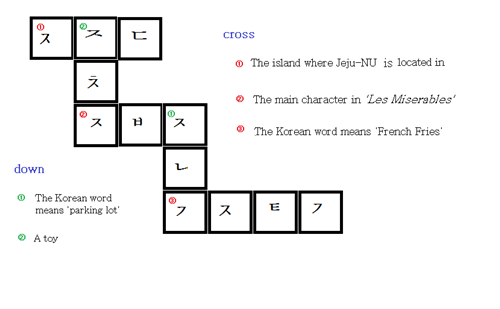
On October 9, the Korean national holiday of Hangul Proclamation Day will celebrate the birth and superiority of Hangul.
Hangul and Jeju-NU
Jeju-NU offers a Korean Language Program to international students and overseas Koreans. The program can improve the students’ Korean proficiency and gives them a way for them to experience Korean culture through a various activities.
One student, Michael Dumar M. Bulong from the Philippines said, “I want to improve my Korean ability. I feel special because I can speak Korean, even not that well. The course is very helpful because the pace is quite fast.”
He also mentioned, “I realized how beautiful the Korean language is. Some expressions are cute whenever it is used. The pronunciation and intonation do not really sound rude even the context is for that situation.”
On September 9, the department of Korean Education held their annual festival with one of its goals to preserve Hangul.
Students in the Korean Education department managed booths that included Korean language puzzles and games.
The department of Korean Education also held its annual writing contest to celebrate Hangul day exactly a month earlier. The contest promoted Hangul’s qualities widely to middle and high school students.
Song Eun-Jin (Korean Language Education, 3) said, “When communicating in Hangul, we should use correct terms and grammar. However, students use Hangul incorrectly and consider grammar unnecessary. I feel very sorry about it because I think Hangul is an important asset to Korea. I want people not to think about Hangul day as just a holiday.”
New Facts about Hangul
In contrast to what people thought they knew, it turns out that Hangul, the Korean language, was invented for studying Chinese as a phonetic key, not for teaching most of the commoners.
Also, Hangul was not independently made but was influenced by other languages like the Phagspa script in the Yuan Dynasty.
Another interesting fact is that Hangul was not made by King Sejong. What King Sejong made is Hunminjeongeum, which is the origin of Hangul. The creator of Hangul is Dr. Ju Si-gyeong. He edited Hunminjeongeum and made into a simpler version, Hangul, 470 years later.
Hangul Goes Global
Nowadays, people usually consider Hangul Day as just a day of rest despite its value. Still, Hangul is widely acknowledged by the world, with even the name of the UNESCO prize for contributors that fight against illiteracy are awarded King Sejong Literacy Prize.

